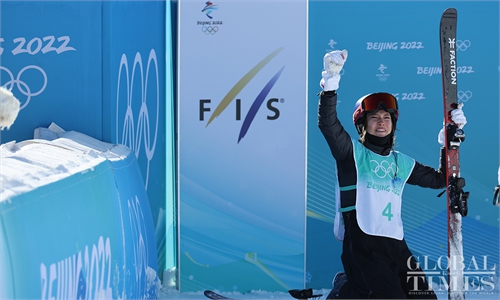There are ‘two public opinion fields’ in the West around the Beijing Winter Games

A canteen robot serves food at the Olympic Village on January 29, 2022 Photo: VCG
The Beijing 2022 Winter Olympic Games are being held as scheduled under global attention. It's an event that shows to the world not only the latest achievements in China's development and governance, but also the common resilience and unity of a community with a shared future for humankind under the threat and challenge of the COVID-19 pandemic.
There is an increasingly significant division between the "two arenas of opinion" in Western discussion about the 2022 Beijing Olympics, showing more people's refusal of distortion, slander and discrediting based on ideological stereotypes. The mainstream of public opinion is more likely to appreciate the high level of competition shown by athletes from different countries, and to applaud the common sporting spirit of humanity from the perspective of a community with a shared future.
There are two "public opinion fields" in the West around the Beijing 2022 Winter Olympics. One is built on inherent ideological stereotypes, in which media outlets set predetermined targets, finding or even fabricating the so-called "evidence" in reporting. The other public opinion field, however, is based on facts and spreads real information.
The former has some typical characteristics of "black psychological warfare" described by George Kennan, an advocate of a policy of containment. Such an opinion field is manipulated by the "gatekeepers" of Western mainstream media such as the New York Times, who are accustomed to sitting in their offices and reporting subjectively on the imaginary world. They even require the audience to assume their reporting has the "only true facts."
The latter is more likely to be an idealized public opinion, which is spread in a fragmented way globally on social media by individuals, especially athletes who come to China to participate in the Games with their smartphones. In the meantime, large paragraphs of rebuttals and criticisms can be found in the comments section of those articles with a style of "black psychological warfare" in the Western mainstream media.
The restless Western media outlets in the first opinion field wrote a series of stories to slander the Beijing Winter Games: The New York Times in several articles targeted the fact that Dinigeer Yilamujiang, an athlete from Northwest China's Xinjiang Uygur Autonomous Region, served as the Beijing 2022 Olympic cauldron lighter. Vanessa Friedman, fashion director and chief fashion critic at The New York Times criticized the "gender differentiation" by Team China's uniform. Articles by CNN and others criticized the "artificial snow" of the Winter Olympics with seemingly scientific but absurd descriptions. A Dutch journalist intentionally did a live broadcast in an area under temporary control that Beijing police had notified before. The list goes on and on. The "competition" among Western media outlets has been increasingly fiercer in its smearing and distorting facts about China, especially in the case of the Winter Olympics.
In stark contrast to the first public opinion field, which is heavily tainted by "black psychological warfare," the second public opinion field, which is carried by social media and video platforms where the athletes share their lives in the Olympic Village, shows the full and real picture of the Games. Meanwhile, ordinary netizens outside of China speak out against media outlets' absurd reports. Those people continue to fight against the misinformation and disinformation disseminated by elites via their monopoly of traditional media platforms.
The author is a professor at the School of International Relations and Public Affairs of Fudan University. opinion@globaltimes.com.cn

